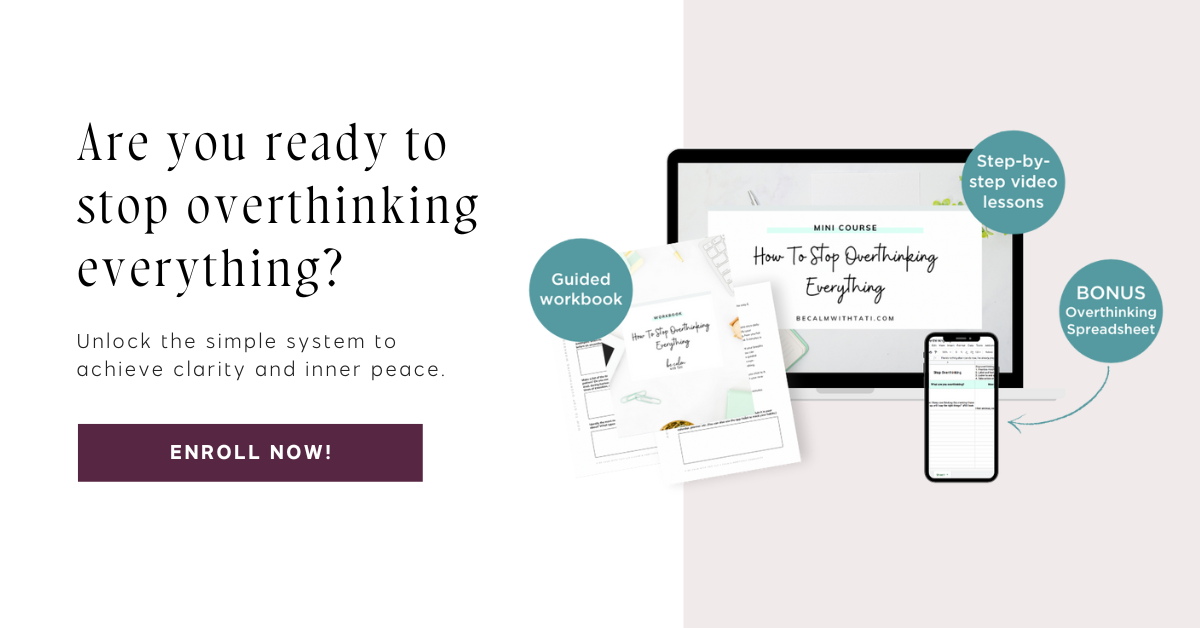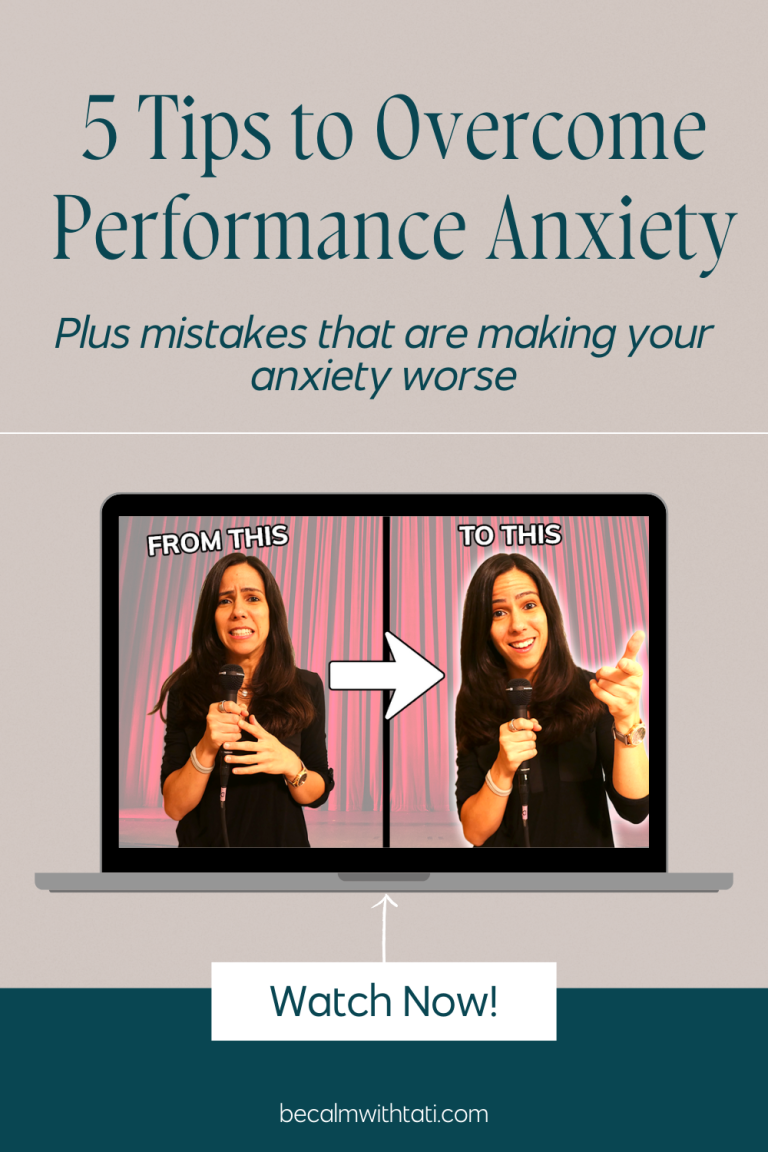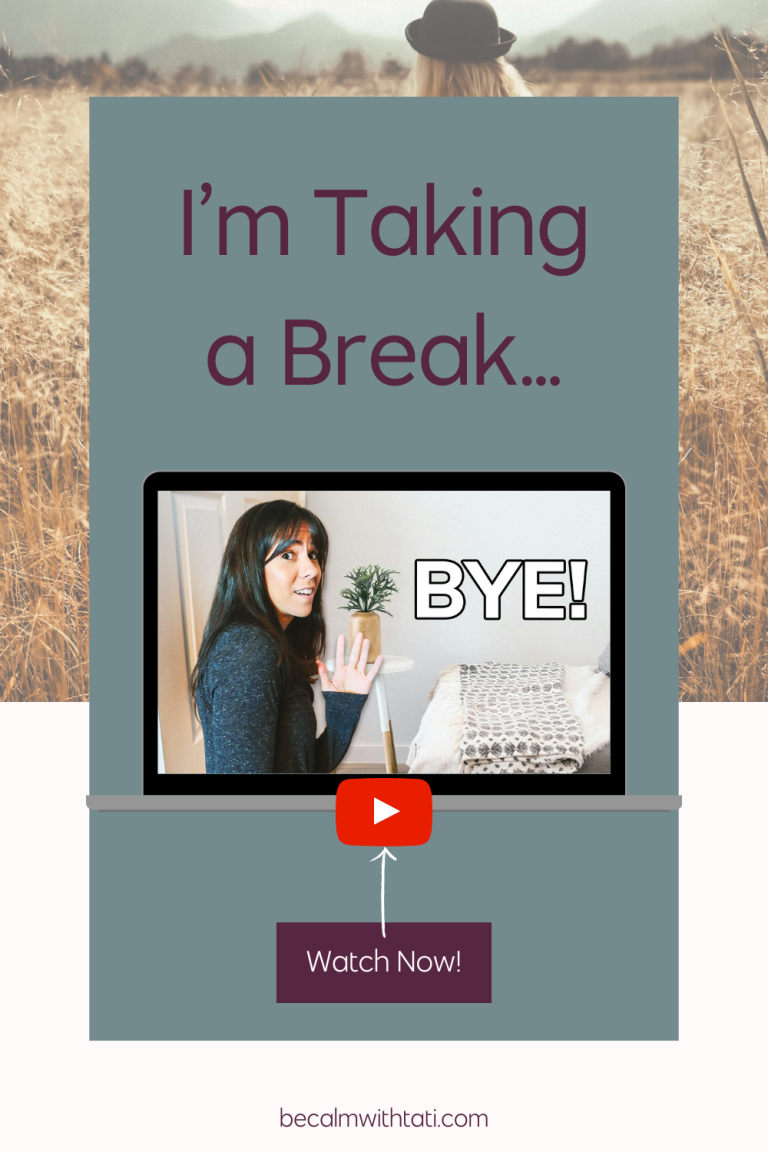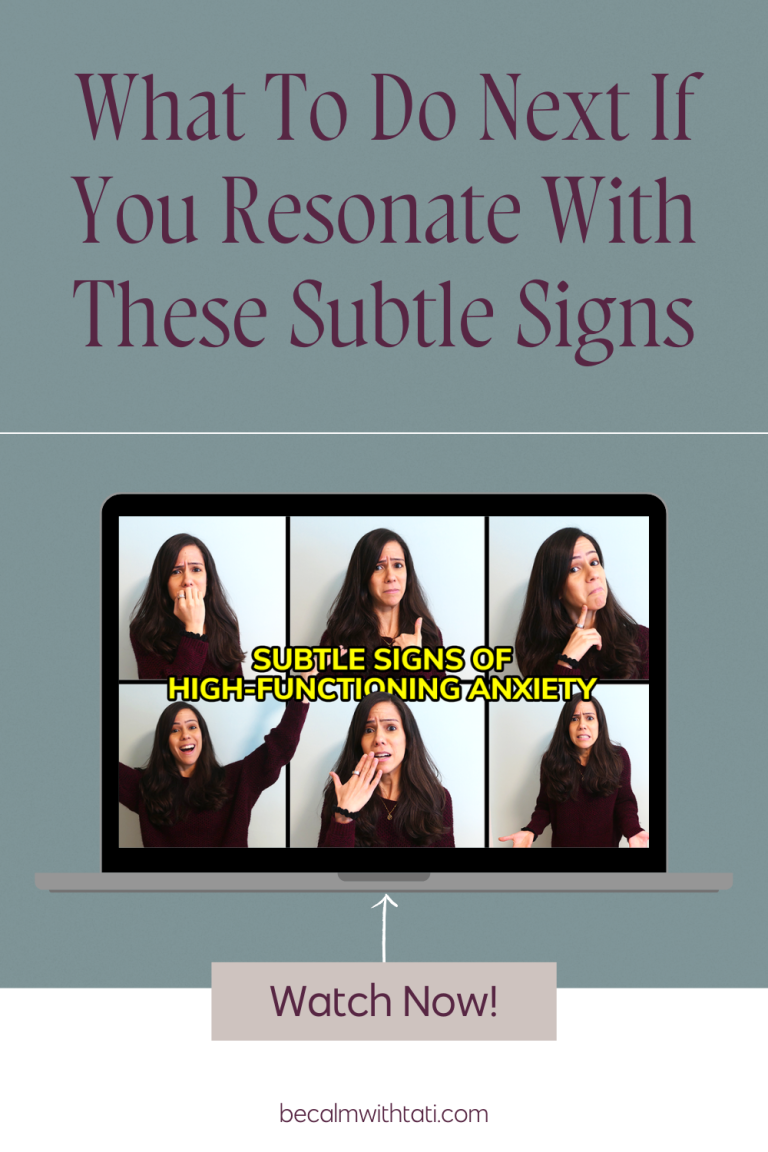Overthinking things is the number one struggle I hear from my audience. I asked my Facebook group members what their number one struggle with high-functioning anxiety is. Here are some examples of those struggles:
“Overthinking every tiny little thing and every conversation but no one else having any idea that I do this.”
“Overthinking everything. Can’t concentrate on my research papers.”
“Turning off my brain, when I am supposed to be relaxing. I am constantly going over all the details of my day and how to improve and prepare for the next day.”
“My brain not turning off.”
“I can’t settle down, my mind is racing and I have anticipatory anxiety”
If any of these sound like you, then know that you are not alone. Overthinking can be so overwhelming and frustrating because it can feel as though you have no escape. That’s because you can escape anything, except for yourself.
Keep watching/listening/reading to learn more about what to do when you can’t stop overthinking everything, so you won’t always feel the need and urge to escape yourself.

Why Do You Overthink Everything?
Overthinking: when you think about something too much or for too long. Why does it happen? Is there a function or purpose to it?
There are two directions your overthinking can go: thinking too much about something that happened in the past, or thinking too much about a decision or something that might happen in the future.
Overthinking about the past can be about topics such as how you appeared in a social situation (“I shouldn’t have said that, what do they think of me now?”). It can also include thinking a lot about past regrets, traumas, or other difficult experiences from your past.
Typically, overthinking about the past can result in increased feelings of sadness and depression.
Overthinking about the future can often come from a place of fear, and can result in anxiety. You might overthink a decision you have to make, or worry about the worst-case scenario in something you have to do coming up, like a job interview, a presentation, or a difficult conversation.
Overthinking can give you a false sense of control, because it feels as though you are mentally problem-solving and preparing for the future… but it’s a lie. Overthinking (especially when it’s negative) only results in you feeling WORSE and potentially blowing the negative out of proportion.
You might overthink for the following reasons:
- Stressors in your life
- Anticipatory anxiety
- Fear, which can lead to anxiety
- Insecurity or self-doubt

What To Do When You Can’t Stop Overthinking Everything
Step 1: Practice Mindfulness
First, practice mindfulness. This doesn’t mean you have to drop everything and meditate Mindfulness simply means non-judgmental present moment awareness. One of the 7 attitudes of mindfulness is acceptance. Acceptance of the present and what is happening right now.
One important clarification: acceptance doesn’t mean resignation. It doesn’t mean that you are happy with what is happening, or that you are just going to be apathetic to your reality.
Acceptance means allowing what is happening right now to happen, without judgment or resistance. When you resist the present, by trying to stop overthinking, or by trying to judge yourself for overthinking, this creates more negative emotions and difficulty.
Long story short: you are just making things worse for yourself and piling on more difficult emotions and negative thoughts when you judge and resist your reality of overthinking.
Acceptance equals allowing, which is an important component to help you stop overthinking. It seems counterintuitive, but I promise it works.
Step 2: Be With The Discomfort
This is probably the last thing you want to hear, right? Who wants to feel uncomfortable and sit with their difficult emotions?
But what if I told you that avoiding your difficult emotions and negative thoughts is what got you here in the first place? Your emotions are powerful signals that drive your mind and body to take action.
When you continually avoid and suppress your emotions, this results in increased stress, anxiety, and difficult emotions, which results in more overthinking. Your mind craves the positive emotions that come from instant gratification, like watching the exact movie you want to see right now, getting dopamine inducing notifications on your phone, or having a nice, sugary snack.
Ultimately, choosing instant gratification means choosing short-term pleasure over long-term happiness. It is absolutely essential to acknowledge and feel your difficult emotions in order to process them and feel better in the long run.
When you do not process your emotions fully, this results in emotional buildup, and these below-the-surface emotions create the perfect breeding ground for overthinking.
Processing Difficult Emotions
So in these moments I want you to do two things:
- Label any emotion(s) you are currently feeling. Example: I feel anxious, insecure, nervous, and worried. As a bonus, write down how you’re feeling and why. This can help you become more clear on what’s going on in your head. View it as a brain dump of your thoughts. I love using the mood tracking app Daylio for this, but you can also use the notes section of your phone or a journal.
- Feel your emotions, however you can feel it physically. Emotions are stored physically in the body. Sometimes emotional buildup can result in tears and crying, and sometimes it can feel like a weight on your chest (this is often what anxiety feels like for me), tension in your upper back, facial muscles, hip, neck, etc., difficulty breathing, an increased heart rate, a headache, etc.
Close your eyes, take a few deep breaths, and allow that physical sensation to be in a time and place you feel safe to do so. The feeling may intensify as you bring awareness to it, and that’s okay. That’s a consequence of you facing and validating the emotion, and that is how you process the emotion.
Do this until the sensation goes away, or for as long as you feel comfortable doing so. Don’t try to make the sensation or emotion go away, just notice that it is there.

Step 3: Listen To Yourself
Next, it’s important to assess: are you overthinking because of a certain difficult decision, because of fear, or because of something in your gut or intuition that is really important to you?
If your thoughts are grounded in fear, worry, what if’s, and the worst-case scenario, then it’s important to be skeptical of your thoughts: are they helping you right now, or just trying to keep you safe and prepare for the worst? Anxious and negative thoughts can be lying to you, and in those moments I find it extremely helpful to ask yourself this one question:
Is this helpful?
Are these thoughts helping you right now, or just causing you more stress, worry, and frustration?
If you are making a difficult decision or anticipating something coming up that you just can’t stop thinking about, then again ask yourself: Is this helpful?
If you cannot take action in the present moment and you are not actively planning or deciding things and these thoughts are coming up throughout your day, then they are NOT helping you!
Lastly, if you have this inner voice that is telling you to do something: stand up for yourself, quit your job, profess your love for this person, just do this thing, then this might be your gut, otherwise called your intuition.
It’s that internal voice within that guides you towards making decisions that are in line with your core values. Ask yourself: is this something that is important to you? Do you keep overthinking this because you’re avoiding doing something that you really want to do?
These questions can help you get to the intentions underneath your thoughts: is it fear or is it desire?
Step 4: Take Action or Let Go
Taking action can help massively if you are avoiding something that you are afraid of. Just call that person, check that task you really don’t want to do off your to-do list, or plan for that presentation coming up.
When you take action, it can help you face your fear, which is often followed by a feeling of relief. Taking action can also help you STOP overthinking, especially when you are avoiding something!
And if you can’t take action because you are overthinking something you have no control over (like what your neighbor thinks of you) or you are overthinking something in the future (like when you have the Sunday scaries before the work week begins)… then practice letting go!
Letting go is an art, and it takes time to become an automatic skill, but it is totally possible.
Tell yourself: there is nothing I can do about this now, so I choose to focus on something else. And then focus on something else! Choose a healthy distraction like going for a walk, watching your favorite TV show, engaging in a hobby, spending time with friends and family, or anything that will put you in the present moment and bring you joy.
Your action tip is to take these tips I’ve shared and put them into action, because nothing changes if you don’t change! Practice listening to yourself rather than avoiding what your mind and body are trying to tell you, and remember that this is a practice, and it takes time and consistency to fully integrate these tips into your life.
I’d love to hear your thoughts on overthinking. Leave a comment below letting me know your thoughts!
Special Announcement!
I have amazing news if you are looking for support in implementing these tips! This is the exact topic I am going to walk you through week-by-week in the first monthly training for my brand new Calm & Ambitious Community membership.
This is an exclusive community to help high-achievers with high-functioning anxiety be ambitious and high-achieving on the outside, while feeling calm and grounded on the inside. Each month I will release a brand new training bundle with short, yet mighty and actionable trainings and a workbook to help you integrate the concepts.
You will also have access to a private community that is working through the exercises with you, and a live monthly call to ask any questions that might come up. If you’re catching when it’s first released, or anytime in the future, you will still have access to this training!
Learn more and how you can join us at calmandambitious.com!
















2 Comments
I have taken CBT therapy and learn to replace negative thinking with positive but my random thinking never shut down .what should I do to avoid self talking ?
Hi Tayyaba, thanks for your comment! That’s great that you attended CBT therapy. It’s impossible to completely stop random thoughts, because thinking is what our minds do! Mindfulness and meditation practices are really helpful to improve focus and awareness which will help so you don’t get caught up in thought spirals. You can check out my blog post on how to meditate for anxiety here: http://becalmdev.favjfk66cn-gjy3m1x8v38q.p.temp-site.link/how-to-meditate-for-anxiety/